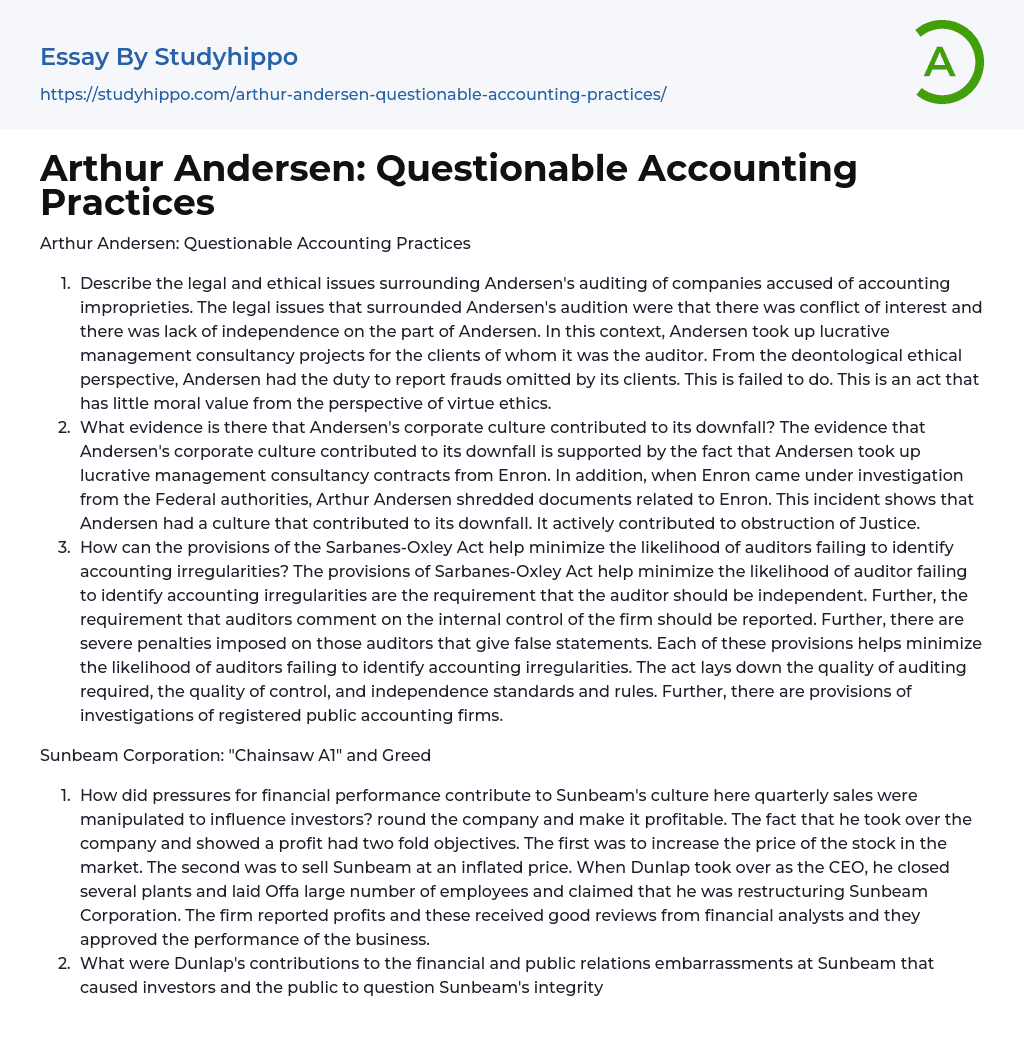

Arthur Andersen: Questionable Accounting Practices Essay Example
Arthur Andersen: Questionable Accounting Practices
- Describe the legal and ethical issues surrounding Andersen's auditing of companies accused of accounting improprieties. The legal issues that surrounded Andersen's audition were that there was conflict of interest and there was lack of independence on the part of Andersen. In this context, Andersen took up lucrative management consultancy projects for the clients of whom it was the auditor. From the deontological ethical perspective, Andersen had the duty to report frauds omitted by its clients. This is failed to do. This is an act that has little moral value from the perspective of virtue ethics.
- What evidence is there that Andersen's corporate culture contributed to its downfall? The evidence that Andersen's corporate culture contributed to its downfall is supported by the fact that Andersen took up lucrative management consultancy contracts from Enron.
...In addition, when Enron came under investigation from the Federal authorities, Arthur Andersen shredded documents related to Enron. This incident shows that Andersen had a culture that contributed to its downfall. It actively contributed to obstruction of Justice.
- How can the provisions of the Sarbanes-Oxley Act help minimize the likelihood of auditors failing to identify accounting irregularities? The provisions of Sarbanes-Oxley Act help minimize the likelihood of auditor failing to identify accounting irregularities are the requirement that the auditor should be independent. Further, the requirement that auditors comment on the internal control of the firm should be reported. Further, there are severe penalties imposed on those auditors that give false statements. Each of these provisions helps minimize the likelihood of auditors failing to identify accounting irregularities. The act lays down the quality of auditing required, the quality
View entire sampleJoin StudyHippo to see entire essay - How can the provisions of the Sarbanes-Oxley Act help minimize the likelihood of auditors failing to identify accounting irregularities? The provisions of Sarbanes-Oxley Act help minimize the likelihood of auditor failing to identify accounting irregularities are the requirement that the auditor should be independent. Further, the requirement that auditors comment on the internal control of the firm should be reported. Further, there are severe penalties imposed on those auditors that give false statements. Each of these provisions helps minimize the likelihood of auditors failing to identify accounting irregularities. The act lays down the quality of auditing required, the quality
of control, and independence standards and rules. Further, there are provisions of investigations of registered public accounting firms.
Sunbeam Corporation: "Chainsaw A1" and Greed
- How did pressures for financial performance contribute to Sunbeam's culture here quarterly sales were manipulated to influence investors? round the company and make it profitable. The fact that he took over the company and showed a profit had two fold objectives. The first was to increase the price of the stock in the market. The second was to sell Sunbeam at an inflated price. When Dunlap took over as the CEO, he closed several plants and laid Offa large number of employees and claimed that he was restructuring Sunbeam Corporation. The firm reported profits and these received good reviews from financial analysts and they approved the performance of the business.
- What were Dunlap's contributions to the financial and public relations embarrassments at Sunbeam that caused investors and the public to question Sunbeam's integrity? Sunbeam Corporation was embarrassed by Dunlap's actions. His actions were criticized by the SEC. The SEC pointed out that $62 million of Sunbeam Corporation's income did not comply with accounting rules. Moreover, the SEC named Dunlap that he had inflated earnings of Sunbeam Corporation. Dunlap reduced the value of its inventory so that it could record large profits when goods were sold. SEC pointed out that Dunlap had increased the sales by stuffing channels and putting inventories into books of distributors and retailers.
- Identify ethical issues that Dunlap's management team may have created by adopting a short-run focus on financial performance. What lessons could be learned from the outcome? The ethical issue related to Dunlap's management from the
consequential ethics perspective is that if Sunbeam Corporation inflated the income of the company for one year, a time will come when either the scam was exposed or it became impossible to inflate the profits. At that point the consequences for the company and its employees would be disastrous. Also from the utilitarian perspective the action of firing a large number of employees is not an action of high moral worth. Such an action brought suffering to a large number of employees and their families. From the point of view of virtue ethics it was not an act of good character to show inflated income. Most importantly, when Arthur Anderson asked Sunbeam Corporation to rectify its account and it did not, Arthur Andersen should not have certified Sunbeam Corporation's financial statement.
- Accounts Receivable essays
- Auditor's Report essays
- Balance Sheet essays
- Costs essays
- Financial Audit essays
- International Financial Reporting Standards essays
- Tax essays
- Accountability essays
- Cash essays
- Principal essays
- Management Accounting essays
- Internal Control essays
- Accounting Software essays
- Cash Flow essays
- Values of Life essays
- Ethical dilemma essays
- Normative Ethics essays
- Virtue Ethics essays
- Belief essays
- Deontology essays
- Moral essays
- Virtue essays
- Work Ethic essays
- Accounting essays
- Andrew Carnegie essays
- Automation essays
- Business Cycle essays
- Business Intelligence essays
- Business Model essays
- Business Operations essays
- Business Software essays
- Cooperation essays
- Cooperative essays
- Corporate Social Responsibility essays
- Corporation essays
- Customer Relationship Management essays
- Family Business essays
- Franchising essays
- Harvard Business School essays
- Harvard university essays
- Human Resource Management essays
- Infrastructure essays
- Inventory essays
- Logistics essays
- Management essays
- Manufacturing essays
- Market essays
- Marketing essays
- Multinational Corporation essays
- News Media essays



